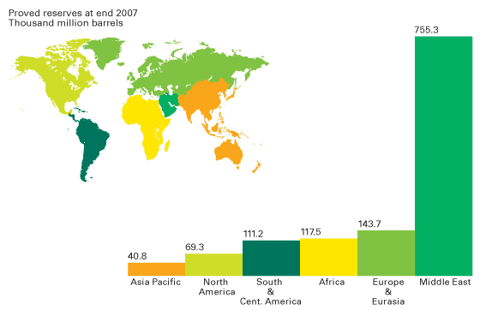
1,238 Billion Barrels of Oil Reserves
"We're not running out of hydrocarbons,” insists Tony Hayward, the boss of BP, one of the world’s biggest oil firms. To back up this view, he cites various comforting figures from the latest edition of the firm’s “Statistical Review of World Energy," released today.It's more like >225 trillion barrels of proven reserves.
Enough oil has already been discovered around the world, Hayward says, to maintain consumption at current levels for another 42 years. As he put it, humanity has guzzled through 1 trillion barrels, but has its next trillion already lined up, and could probably unearth a third trillion if it really applied itself.
Titan's Surface Organics Surpass Oil Reserves on Earth.
Saturn's orange moon Titan has hundreds of times more liquid hydrocarbons than all the known oil and natural gas reserves on Earth, according to new data from NASA's Cassini spacecraft. The hydrocarbons rain from the sky, collecting in vast deposits that form lakes and dunes.Transocean should change it's name to Transpace and start developing our natural resources.














3 comments:
THE WORLD OIL MAP: WHAT'S WRONG WITH IT?
Nothing in one sense. This is a map reflecting "PROVED" reserves.
The 64 Trillion Dollar Question: What are the yet to be discovered "unproven" reserves?
Abiotic Principles suggest this, as still unknown number, is much higher -- how much higher?
Middle East 755.3
Europe & Eurasia 143.7
Africa 117.5
South & Central America 111.2
North America 69.3
Asia Pacific 40.8
TOTAL ________
1,238 Billion
Well, take a look at the map.
Abiotic Principles suggest the total is much higher for every region.
The Middle East has not explored "At Depth" yet, at all. Following Kudryavtsev's Rule: In petroleum regions, oil reservoirs will be found in the stratigraphic column down to the bedrock and beyond.
In short:
Where there's oil,
there's more oil.
So, for the Middle East, let's take a conservative Abiotic estimate of total proved and unproven reserves of 1,250 billion barrels of oil.
Europe & Eurasia, which includes Russia, the second leading oil producer in the world (and briefly #1). This number could easily top over 300 billion.
Africa is largely unexplored, including its offshore water out to 350 miles at sea, could top over 275 billion.
South & Central America, is just starting to come into its own, also comes in at over 250 billion.
North America, the big sleeper, even with a century of exploration and production focussing on Texas, under its belt, considering, the "Full Monte" in Alaska, and opening up the U.S. Eastern seaboard, the Eastern Gulf of Mexico, and off the California coast, plus Canada, we're looking at at least 200 billion.
Asia Pacific is a wild card. Indonesia has been under-performing, and massive continental shelf and continental margin is unexplored, let's be conservative and say 100 billion.
The total is 2,375 billion barrels of oil. And this is a conservative estimate.
So, at very conservative estimate, figuring 31 billion barrels a year, that works out to 76.6 years.
Does that provide a working margin?
And how much larger could the reserves get if each region undergoes an order of magnitude increase in oil production?
What would a true order of magnitude increase in proven reserves look like: 4 Tillion Barrels of oil -- that'll do ya.
Well over 100 years of oil.
Exactly. Unproven reserves are much more interesting than proven reserves.
ARE THE LARGEST FIELDS DISCOVERED FIRST?
WHERE IS THE UNDISCOVERED OIL?
QUALIFICATION
Objection: "I thought you said 200 years of oil, in an earlier comment, even if Abiotic Oil doesn't regenerate, which you now suggest does regenerate at some "unknown" rate, due to your Crustal Activity Continuum principle?"
Answer: Well, as Alan Greenspan said, occasionally, this writer gets caught up in "irrational exurberance." And, maybe, it will still prove to be "rational exuberance."
But in the context of formal predictions about the future, it pays to make conservative estimates because you never know what the future will bring.
Post a Comment